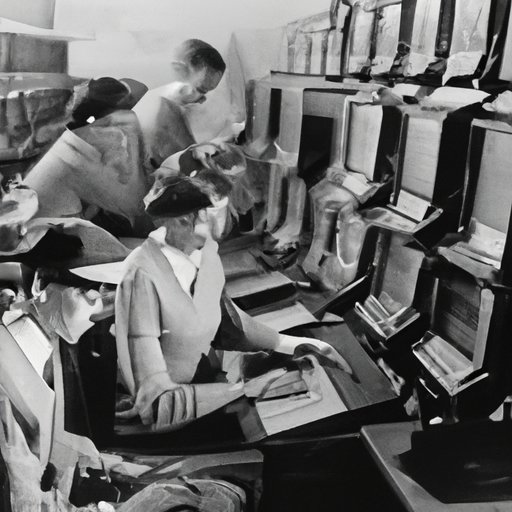Introduction
Computer science is a rapidly-evolving field that has changed the way we live our lives. But who was responsible for the invention of computer science in the first place? This article will explore the history and development of computer science, as well as the impact it has had on society. We’ll look at who the pioneers of this field were, what major contributions they made, and how computer science has evolved over time.

Biography of the Inventor of Computer Science
The inventor of computer science is widely considered to be Alan Turing, an English mathematician, logician, and cryptanalyst. Turing was born in 1912 in London and studied mathematics at Cambridge University. He developed many groundbreaking theories in mathematics and logic, and his work laid the foundation for modern computing. His most famous contribution is the “Turing Test,” which is used to determine whether or not a computer can think like a human.
In 1936, Turing wrote a paper titled “On Computable Numbers, with an Application to the Entscheidungsproblem,” which proposed the concept of a universal machine capable of performing any calculation. This paper is widely regarded as the foundation of computer science, and it established Turing as one of the most influential figures in the history of computing. Turing went on to develop the Bombe, a machine that could break German Enigma codes during World War II. This machine helped the Allies win the war and saved countless lives.
A History of Computer Science & Its Pioneers
Turing was not the only pioneer of computer science. In the 1930s and 1940s, a number of other researchers made major contributions to the field. Konrad Zuse, a German engineer, built the first programmable computer in 1941. John Von Neumann, a Hungarian mathematician, developed the architecture that is still used in modern computers. Grace Hopper, an American computer scientist, developed the first compiler, which allowed computers to understand and translate human language into code.
These pioneers laid the groundwork for the development of modern computers, and their work is still being used today. For example, Von Neumann’s architecture is still being used in computers and other electronic devices, and Hopper’s compiler is still used in programming languages such as Java. These pioneers also showed us the importance of collaboration and teamwork in achieving great things.
Exploring the Impact of Computer Science on Society
Computer science has had a profound impact on society. From communication and transportation to medicine and education, computer science has revolutionized the way we live. Thanks to computer science, we have access to a wealth of information at our fingertips, and we can communicate with people all over the world in an instant. It has also enabled us to automate processes and streamline operations, making businesses more efficient and productive.
Computer science has also had a positive effect on our daily lives. We now have access to endless entertainment options, from streaming music and movies to playing video games. We can shop online, book flights, and even find love through dating apps. In short, computer science has made our lives easier and more enjoyable.

Examining the Challenges Faced by Early Computer Scientists
Despite their achievements, early computer scientists faced numerous challenges. They had to overcome technological limitations such as limited memory and slow processing speeds. They also had to grapple with ethical issues, such as privacy and security concerns. Additionally, the field was largely male-dominated, and female computer scientists often faced discrimination and sexism.
However, these pioneers persevered and pushed forward despite the obstacles. Their dedication and hard work paved the way for future generations of computer scientists, and their achievements are still celebrated today.
How Computer Science Has Evolved Since Its Invention
Since its invention, computer science has undergone tremendous changes. Advances in technology have led to the development of powerful new tools and techniques, such as artificial intelligence and machine learning. The internet has also revolutionized the way we access and share information, enabling us to connect with people around the world in an instant.
As computer science continues to evolve, new technologies are emerging every day. These innovations have opened up new possibilities for businesses and individuals, from self-driving cars to virtual reality. Computer science is no longer just about coding and programming; it’s about creating solutions to real-world problems.

An Interview with a Living Computer Scientist
To gain further insight into the current state of computer science, we spoke to Dr. Tom Murphy, a professor of computer science at Stanford University. Dr. Murphy is a leader in the field, having co-authored several books on computer science and developing new algorithms for AI applications. Here’s what he had to say about the current state of the field:
“Computer science is an ever-evolving field, and I’m excited to see what the future holds. We’re already seeing the rise of artificial intelligence and machine learning, and I think those technologies will continue to shape our lives in the years to come. And of course, we can’t forget about the importance of cybersecurity – it’s essential for keeping our data safe and secure.”
What Would Life Be Like Without Computer Science?
It’s difficult to imagine what life would be like without computer science. We rely on computers for almost every aspect of our lives, from banking and shopping to entertainment and communication. We use computers to store and share data, analyze data, and even make decisions. Without computer science, many of the conveniences we enjoy today simply wouldn’t exist.
But computer science has done more than just make our lives easier and more convenient; it has also changed the way we think and interact with each other. By connecting us with people around the world, computer science has brought us closer together and given us the opportunity to collaborate on projects and exchange ideas.
Conclusion
Computer science has revolutionized the way we live our lives, and its impact cannot be overstated. From Alan Turing to Grace Hopper, the pioneers of this field have made tremendous contributions that are still being felt today. As computer science continues to evolve, we can expect to see new technologies emerge that will further enhance our lives.
(Note: Is this article not meeting your expectations? Do you have knowledge or insights to share? Unlock new opportunities and expand your reach by joining our authors team. Click Registration to join us and share your expertise with our readers.)
